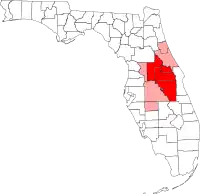Maitland, Florida | |
|---|---|
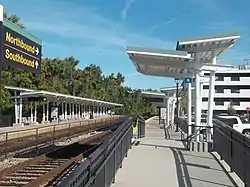 Maitland station | |
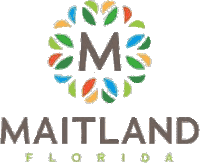 Logo | |
| Motto: A Community For Life | |
 | |
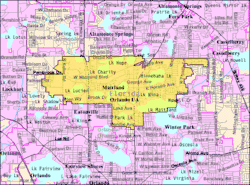 U.S. Census map | |
| Coordinates: 28°37′37″N 81°22′01″W / 28.62694°N 81.36694°W | |
| Country | |
| State | |
| County | Orange |
| Incorporated (Town) | July 17, 1885 |
| Incorporated (City) | June 1, 1959 |
| Area | |
| • Total | 6.48 sq mi (16.78 km2) |
| • Land | 5.36 sq mi (13.88 km2) |
| • Water | 1.12 sq mi (2.89 km2) |
| Elevation | 75 ft (23 m) |
| Population (2020) | |
| • Total | 19,543 |
| • Estimate (2021)[3] | 18,959 |
| • Density | 3,646.08/sq mi (1,407.78/km2) |
| Time zone | UTC-5 (Eastern (EST)) |
| • Summer (DST) | UTC-4 (EDT) |
| ZIP codes | 32751, 32794 |
| Area code(s) | 407, 689 |
| FIPS code | 12-42575[4] |
| GNIS feature ID | 2405000[2] |
| Website | www |
Maitland is a suburban city in Orange County, Florida, United States, part of the Greater Orlando area. The population was 19,543 at the 2020 census.[5] The area's history is exhibited at the Maitland Historical Museum; the city also hosts the Maitland Art Center, as well as notable examples of Mayan Revival architecture and Fantasy architecture, the Maitland Telephone Museum, and the William H. Waterhouse House Museum (all museums and the Maitland Art Center are now managed by Art & History Museums of Maitland). A SunRail station is located in Maitland on Highway 17-92. The city is named for Fort Maitland.
History
Maitland is one of the oldest incorporated suburban municipalities in central Florida. The area was previously inhabited by Timucuan Native Americans. The town was originally named for a nearby Lake, which honored Captain William Seton Maitland, who fought in the Second Seminole Indian War, and was slain in the battle of Wahoo Swamp. A small military outpost was built in 1838 on the western shore of Lake Fumecheliga (later Lake Maitland) during the Second Seminole War.[6] After the Civil War, new residents arrived in the area. Christopher Columbus Beasley, perhaps the first permanent settler, arrived at Lake Maitland in 1871. A post office opened on January 2 of the next year and operated in his home.[7] Around this post office, a small town grew. In the closing decades of the nineteenth century the area was put into extensive citrus production.[8]
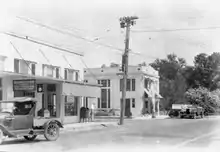
Lake Maitland was incorporated as a town in 1885, the third such town in Orange County to do so. In its infancy, Lake Maitland was often characterized as a rural village, with streets lined with large oak trees planted by early town aldermen. However, the old town began to rapidly modernize as Orlando's suburban sprawl reached the town in the mid 1920s.
During this period the town grew rapidly as new houses and roads were built. In 1959, Maitland was incorporated as a city.
Maitland is a suburb of Orlando. The town's "historical corridor" encompasses old residences still standing and occupied in the Lake Lily-Lake Catherine area and extending through the central portion of the city. Examples of these century-old structures include the "Church of the Good Shepherd" (1883); the "William H. Waterhouse House" (1884); the Maitland Public Library (1907); and the "Maitland Art Center" (1937).[8] The area has always been a vacation spot because of its climate, location to theme parks and people. Maitland has many picturesque parks along lakes, which attract many boaters.
Geography
Maitland is located at 28°37′37″N 81°22′1″W / 28.62694°N 81.36694°W (28.626926, −81.366961).[9]
According to the United States Census Bureau, the city has a total area of 6.4 square miles (16.6 km2), of which 5.3 square miles (13.6 km2) is land and 1.2 square miles (3.0 km2) (17.84%) is water. The city of Maitland has a total of 21 lakes, the largest being Lake Maitland (451 acres).[10]
Demographics
| Census | Pop. | Note | %± |
|---|---|---|---|
| 1900 | 136 | — | |
| 1910 | 157 | 15.4% | |
| 1920 | 172 | 9.6% | |
| 1930 | 511 | 197.1% | |
| 1940 | 463 | −9.4% | |
| 1950 | 889 | 92.0% | |
| 1960 | 3,570 | 301.6% | |
| 1970 | 7,157 | 100.5% | |
| 1980 | 8,763 | 22.4% | |
| 1990 | 9,110 | 4.0% | |
| 2000 | 12,019 | 31.9% | |
| 2010 | 15,751 | 31.1% | |
| 2020 | 19,543 | 24.1% | |
| 2022 (est.) | 19,356 | [5] | −1.0% |
| U.S. Decennial Census[11] | |||
| Race | Pop 2010[12] | Pop 2020[13] | % 2010 | % 2020 |
|---|---|---|---|---|
| White (NH) | 11,595 | 12,360 | 73.61% | 63.25% |
| Black or African American (NH) | 1,657 | 2,194 | 10.52% | 11.23% |
| Native American or Alaska Native (NH) | 17 | 24 | 0.11% | 0.12% |
| Asian (NH) | 538 | 881 | 3.42% | 4.51% |
| Pacific Islander or Native Hawaiian (NH) | 5 | 4 | 0.03% | 0.02% |
| Some other race (NH) | 35 | 249 | 0.22% | 1.27% |
| Two or more races/Multiracial (NH) | 262 | 771 | 1.66% | 3.95% |
| Hispanic or Latino (any race) | 1,642 | 3,060 | 10.42% | 15.66% |
| Total | 15,751 | 19,543 | ||
As of the 2020 United States census, there were 19,543 people, 7,510 households, and 4,422 families residing in the city.[14]
In 2020, there were 7,510 households, out of which 22.1% had children under the age of 18 living with them, 44.6% were married couples living together, 10.5% had a female householder with no husband present, and 41.1% were non-families. 30.3% of all households were made up of individuals, and 7.8% had someone living alone who was 65 years of age or older. The average household size was 2.34 and the average family size was 2.93.

In 2020, in the city, the population was spread out, with 23.7% under the age of 18, 4.8% from 18 to 24, 40.8% from 25 to 44, 21.3% from 45 to 64, and 9.4% who were 65 years of age or older. The median age was 36.6 years. For every 100 females, there were 88 males. For every 100 females age 18 and over, there were 84.1 males.
In 2020, the median income for a household in the city was $79,821, and the median income for a family was $100,978. Males had a median income of $53,542 versus $30,256 for females. The per capita income for the city was $49,378. About 8.7% of families and 10.1% of the population were below the poverty line, including 12.4% of those under age 18 and 5.1% of those age 65 or over.
As of the 2010 United States census, there were 15,751 people, 6,274 households, and 3,818 families residing in the city.[15]
Economy

The Maitland Center was established in 1982 adjacent to Interstate 4. Today its 226 acres (91 ha) include over 400 businesses and over 45 office buildings.[16]
Worldwide Brands has its headquarters in Maitland.[17]
Other local employers include:
- Sonny's Real Pit Bar-B-Q
- Fidelity Integrated Financial Solutions[18]
- Charles Schwab Corporation
- The Timothy Plan, a Christian-oriented investing firm.[19]
SunRail, the regional commuter rail service, operates a passenger rail station in Maitland. The first 31-mile (50 km) segment of the system (between DeBary and Sand Lake Road in Orange County) began operations on May 1, 2014.
Culture and recreation
Maitland is home to the nationally recognized and Central Florida's only full-time independent movie theater, Enzian Theater, in turn home to the Florida Film Festival. Maitland is also home to the Art & History Museums – Maitland, including the Maitland Art Center (formerly the Research Studio, 1937), which is a designated a National Historic Landmark (2014) for its unique Mayan Revival and Fantasy architecture; the Maitland Historical Museum; the Maitland Telephone Museum; the William H. Waterhouse House Museum, also listed on the National Register of Historic Places; and the Carpentry Shop Museum. Maitland is also home to The Roth Family Jewish Community Center of Greater Orlando, which serves as the center of Jewish life in Orlando and welcomes people of all backgrounds.[20]
In August 2005 the Maitland Little League team made it to the semifinals of the 2005 Little League World Series.[21]
Notable people
- Dante Bichette, former MLB player
- Chip Caray, TBS's lead play-by-play announcer for the Atlanta Braves and the number two play-by-play man for college football on WTBS
- Jazzy Danziger, winner of the Brittingham Prize in Poetry
- Jan Fortune, former state representative
- Buddy Morrow, leader of the Tommy Dorsey Orchestra
- Michael James Nelson, television actor, writer, producer
- John M. Pierce, writer on and promoter of amateur telescope making
- J. Andre Smith, artist and architect; founder of the Research Studio (now known as the Maitland Art Center)
- Mike Stanley, former MLB player
Education
Orange County Public Schools operates public schools in Maitland.
- Dommerich Elementary School
- Lake Sybelia Elementary School
- Maitland Middle School
Private schools include:
- Maitland Montessori School
- Jewish Academy of Orlando
- Orangewood Christian School
- Park Maitland School
- King of Kings Lutheran School (K3–8) [22]
Institutions of higher education include:
Museums and libraries
- Maitland Historical Museum
- Maitland Public Library
- Telephone Museum
- Waterhouse Carpentry Museum
Points of interest

- Maitland Art Center
- Enzian Theater
- Lake Maitland
- RDV Sportsplex
- William H. Waterhouse House
- Jewish Community Center of Greater Orlando
- Holocaust Memorial Resource and Education Center of Florida
- Audubon Center for Birds of Prey
- Howell Branch Nature Preserve and Park
- Lake Lily – Location for the Maitland Art Festival
- Lake Minnehaha
- Lake Sybelia
- Maitland Community Park
- Maitland Farmer's Market
- Quinn Strong Park
References
- ↑ "2020 U.S. Gazetteer Files". United States Census Bureau. Retrieved October 31, 2021.
- 1 2 U.S. Geological Survey Geographic Names Information System: Maitland, Florida
- ↑ "Population and Housing Unit Estimates". United States Census Bureau. July 1, 2021. Retrieved April 20, 2023.
- ↑ "U.S. Census website". United States Census Bureau. Retrieved January 31, 2008.
- 1 2 "Census.gov Quick Facts Maitland city, Florida". Census.gov. Retrieved April 20, 2023.
- ↑ Dibble, Ernest F. (Fall 1999). "Giveaway Forts: Territorial Forts and the Settlement of Florida". The Florida Historical Quarterly. 78 (2): 218. Retrieved July 11, 2023.
- ↑ "United States Postal Service Postmaster Finder".
- 1 2 "CITY OF MAITLAND". www.itsmymaitland.com. Archived from the original on August 3, 2002.
- ↑ "US Gazetteer files: 2010, 2000, and 1990". United States Census Bureau. February 12, 2011. Retrieved April 23, 2011.
- ↑ "Geographic Identifiers: 2010 Demographic Profile Data (G001): Maitland city, Florida". United States Census Bureau. Retrieved September 20, 2012.
- ↑ "Census of Population and Housing". Census.gov. Retrieved April 20, 2023.
- ↑ "P2 HISPANIC OR LATINO, AND NOT HISPANIC OR LATINO BY RACE - 2010: DEC Redistricting Data (PL 94-171) - Maitland city, Florida". United States Census Bureau.
- ↑ "P2 HISPANIC OR LATINO, AND NOT HISPANIC OR LATINO BY RACE - 2020: DEC Redistricting Data (PL 94-171) - Maitland city, Florida". United States Census Bureau.
- ↑ "S1101 HOUSEHOLDS AND FAMILIES - 2020: Maitland city, Florida". United States Census Bureau.
- ↑ "S1101 HOUSEHOLDS AND FAMILIES - 2010: Maitland city, Florida". United States Census Bureau.
- ↑ "Maitland: A Community For Life". Retrieved on January 22, 2011.
- ↑ "We're Here To Help When You Need Us!" Worldwide Brands. Retrieved on February 26, 2010.
- ↑ "Company profile from Hoover's" Fidelity Integrated Financial Solutions. Retrieved on January 22, 2011.
- ↑ "Are Your Investments a Reflection of You?".
- ↑ "About The Roth Family JCC of Greater Orlando". Retrieved May 11, 2015.
- ↑ "Little League Online". www.littleleague.org. Archived from the original on October 23, 2005.
- ↑ "School Home".

